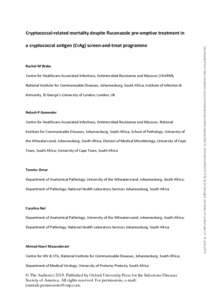Wake, RM; Govender, NP; Omar, T; Nel, C; Mazanderani, AH; Karat, AS; Ismail, NA; Tiemessen, CT; Jarvis, JN; Harrison, TS
(2020)
Cryptococcal-related Mortality Despite Fluconazole Preemptive Treatment in a Cryptococcal Antigen Screen-and-Treat Program.
Clin Infect Dis, 70 (8).
pp. 1683-1690.
ISSN 1537-6591
https://doi.org/10.1093/cid/ciz485
SGUL Authors: Harrison, Thomas Stephen
![[img]](https://openaccess.sgul.ac.uk/110931/1.hassmallThumbnailVersion/ciz485.pdf)  Preview |
|
PDF
Accepted Version
Available under License ["licenses_description_publisher" not defined].
Download (885kB)
| Preview
|
Abstract
Background
Cryptococcal antigen (CrAg) screening and treatment with preemptive fluconazole reduces the incidence of clinically evident cryptococcal meningitis in individuals living with advanced human immunodeficiency virus (HIV) disease. However, mortality remains higher in CrAg-positive than in CrAg-negative patients with similar CD4+ T-lymphocyte counts.
Methods
We conducted a cohort study to investigate causes of morbidity and mortality during 6 months of follow-up among asymptomatic CrAg-positive and CrAg-negative (ratio of 1:2) patients living with HIV with CD4 counts <100 cells/µL attending 2 hospitals in Johannesburg, South Africa. When possible, minimally invasive autopsy (MIA) was performed on participants who died.
Results
Sixty-seven CrAg-positive and 134 CrAg-negative patients were enrolled. Death occurred in 17/67 (25%) CrAg-positive and 12/134 (9%) CrAg-negative participants (hazard ratio for death, adjusted for CD4 count, 3.0; 95% confidence interval, 1.4–6.7; P = .006). Cryptococcal disease was an immediate or contributing cause of death in 12/17 (71%) CrAg-positive participants. Postmortem cryptococcal meningitis and pulmonary cryptococcosis were identified at MIA in all 4 CrAg-positive participants, 3 of whom had negative cerebrospinal fluid CrAg tests from lumbar punctures (LPs) at the time of CrAg screening.
Conclusions
Cryptococcal disease was an important cause of mortality among asymptomatic CrAg-positive participants despite LPs to identify and treat those with subclinical cryptococcal meningitis and preemptive fluconazole for those without meningitis. Thorough investigation for cryptococcal disease with LPs and blood cultures, prompt ART initiation, and more intensive antifungals may reduce mortality among asymptomatic CrAg-positive patients identified through screening.
| Item Type: |
Article
|
| Additional Information: |
This is a pre-copyedited, author-produced version of an article accepted for publication in Clinical Infectious Diseases following peer review. The version of record Rachel M Wake, Nelesh P Govender, Tanvier Omar, Carolina Nel, Ahmad Haeri Mazanderani, Aaron S Karat, Nazir A Ismail, Caroline T Tiemessen, Joseph N Jarvis, Thomas S Harrison, Cryptococcal-related Mortality Despite Fluconazole Preemptive Treatment in a Cryptococcal Antigen Screen-and-Treat Program, Clinical Infectious Diseases, Volume 70, Issue 8, 15 April 2020, Pages 1683–1690 is available online at: https://doi.org/10.1093/cid/ciz485
Correction available at https://doi.org/10.1093/cid/ciz775 |
| Keywords: |
AIDS-related opportunistic infections, Acquired Immunodeficiency Syndrome, Cryptococcus, autopsy, meningitiscryptococcal, 06 Biological Sciences, 11 Medical And Health Sciences, Microbiology |
| SGUL Research Institute / Research Centre: |
Academic Structure > Infection and Immunity Research Institute (INII) |
| Journal or Publication Title: |
Clin Infect Dis |
| ISSN: |
1537-6591 |
| Language: |
eng |
| Dates: |
| Date | Event |
|---|
| 15 April 2020 | Published | | 8 June 2019 | Published Online | | 26 April 2019 | Accepted |
|
| Publisher License: |
Publisher's own licence |
| Projects: |
|
| PubMed ID: |
31179488 |
 |
Go to PubMed abstract |
| URI: |
https://openaccess.sgul.ac.uk/id/eprint/110931 |
| Publisher's version: |
https://doi.org/10.1093/cid/ciz485 |
Statistics
Item downloaded times since 18 Jun 2019.
Actions (login required)
 |
Edit Item |



